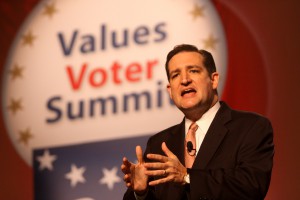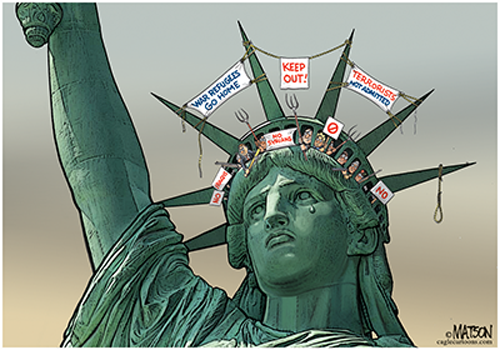Terror-Go-Round: Breaking the Cycle of Xenophobia
 Ted Cruz (Photo by Gage Skidmore)
Ted Cruz (Photo by Gage Skidmore) As the German and French national football teams entertained a crowd of 80,000 supporters inside Paris’s Stade de France on Friday, November 13, three cowardly men—hellbent on the destruction of modernity and peace—tried unsuccessfully to get inside. Rather than wreaking havoc among the fans, the terrorists were forced by a vigilant security staff to accept what must have felt like a cheap consolation prize; they blew themselves up on the outside of the stadium and claimed an innocent life in the process. The match continued unabated.
As we now know, however, the terror didn’t end with the self-annihilation of those three. Elsewhere in Paris, men armed with automatic rifles mowed down over one-hundred unarmed concert goers and restaurant patrons before blowing themselves to smithereens in a crescendo of stolen and wasted life. The terror attacks by Islamist jihadists on unsuspecting Parisians was chilling in its callousness and nauseating in its depravity. Anger and fear were sure to follow. Indeed, the detonations in Paris set off a tsunami of xenophobia that sped across the Atlantic and washed over the American psyche in a surge of dangerous anti-refugee and anti-Muslim hysteria.
Politicians are nothing if not reactive. In the days following the Paris attacks, when asked about the possibility of accepting Syrian refugees, state after state turned red with a resounding “hell no.” Governors and congressmen—mostly Republicans, but a few Democrats too—rushed to slam their doors shut. Some GOP presidential candidates (see below) even went so far as to suggest that the best method for resolving the quandary between compassion and security would be to apply a “religious” test. The verified Christian refugees would be welcomed; the Muslims would be turned away. One can only imagine what such a test might resemble in practice: “What is your favorite holy book? Do you have any cross-shaped jewelry on your person?” (And while we’re verifying religious convictions, can the politicians suggesting this absurd test please recite the parable of the goats and the sheep from Matthew 25?) The idea is as absurd as it is decidedly un-American.
While random acts of violence are certainly terrifying, how did so many end up linking the terror attacks in Paris to the Syrian refugee crisis?
Simply put, a false narrative developed—a narrative that said the violent ISIL jihadists of the Paris attacks snuck across borders by posing as Syrian refugees. The facts say otherwise; all of the identified terrorists were actually European nationals, not refugees. But as we know too well, many choose to believe what fits their own internal narrative rather than what the facts actually indicate. And as we also know, for many those internal narratives were screaming anti-Muslim invectives long before the Paris attacks. Paris was simply another opportunity to draw a tribal boundary between the “good guys” and the “bad guys.”
This is where the meanings of words really start to matter. While it’s true that all Islamist extremists are Muslims, it’s also true that the vast majority of Muslims are not Islamist extremists. The inability or unwillingness of some to make that distinction has created an atmosphere of anti-Muslim xenophobia in the United States that not only brings out the very worst in us—as evidenced by bigots shouting at Muslims at city council meetings, by groups of heavily armed “protestors” surrounding Muslim families at mosques, and by a ranting taxi passenger shooting his Muslim cab driver in the back—it also means terrorism is winning this round.
By vilifying all Muslims, including those refugees in the direst need, and including our friends, neighbors, and colleagues simply trying to live peacefully in America, we are priming the violent jihadist pump. Factions like ISIL, Al Qaeda, and other Islamist groups hungry for another “holy” war simply wait for the disaffected, angry, antagonized, and hypnotized to find them. They want us to retreat into tribes. In fact, they need us to retreat into tribes. To paraphrase political commentator Maajid Nawaz: terrorist groups don’t radicalize. Radicalization occurs elsewhere. Only after convincing oneself of the “righteous cause” do individuals seek out terrorist groups. Violence perpetuates fear and fear precipitates violence.
So what to do? Obviously, terror attacks happen. Obviously, Islam has something to do with attacks performed in the name of Islam. Religious freedom, which is essentially freedom of speech, is a fundamental right guaranteed to all Americans. So where does that leave us?
 First, our politicians must quit fanning the flames of hysteria. They must cease the incessant xenophobic drumbeat. Because the battle against Islamism is, at its core, ideological, and retreating into competing ideological tribes is a strategy that ensures perpetual conflict. In order to extinguish the Islamist ideology, as distinct from the religion of Islam, we have to be both precise and honest in how we talk about the challenge ahead.
First, our politicians must quit fanning the flames of hysteria. They must cease the incessant xenophobic drumbeat. Because the battle against Islamism is, at its core, ideological, and retreating into competing ideological tribes is a strategy that ensures perpetual conflict. In order to extinguish the Islamist ideology, as distinct from the religion of Islam, we have to be both precise and honest in how we talk about the challenge ahead.
Second, we should lead with compassion and with the liberal, secular values that bring peace and prosperity to pluralistic societies everywhere. Rather than cower in fear from the Muslims in need, and rather than castigate our own neighbors, we should be a shining example of enlightenment values at work—not only because it’s morally right, but because, pragmatically, we need majority Muslim countries to demand the same rule of law for themselves. They must see it working. We need to have open and peaceful conversations with the 1.5 billion Muslims who are not going to suddenly jettison their religion. And if we hope to have open and peaceful conversations, we need to recognize that claiming moral authority while turning away the neediest is an indefensible position.
Helping others in need extends compassion and celebrates our shared humanity. Compassion removes cultural barriers. Removing cultural barriers encourages people to listen to new ideas. Listening to new ideas helps people learn. Learning helps people determine what’s true. Understanding what’s true helps people abandon irrational beliefs. Getting rid of irrational beliefs removes the justification for harmful behaviors inspired by those beliefs. Eliminating harmful behaviors that cause others to suffer means people no longer need to seek refuge. Thus, through compassion, the cycle is broken.
